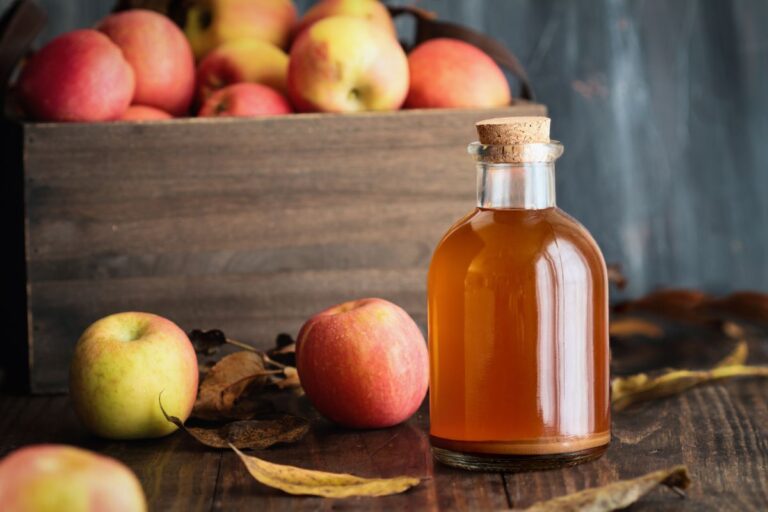In the realm of health and wellness, few items have garnered as much acclaim and as many raised eyebrows as apple cider vinegar (ACV). Sworn by some as a panacea, ACV has been touted for its myriad health benefits, from aiding weight loss to improving heart health. However, amidst the fervor surrounding its health benefits, a practical question often gets overlooked: does apple cider vinegar need to be refrigerated? My stance, shaped both by personal experience and digging through the annals of food preservation wisdom, is a resounding no. And here’s why.
Learn about storing apple cider vinegar
- No, apple cider vinegar does not need to be refrigerated.
- Store it in a cool, dark place.
- It can last for a long time if stored properly.
Does apple cider vinegar need to be refrigerated?
Apple cider vinegar, with its acidic nature, is self-preserving. The very essence that makes it a stalwart in the natural health community—the acetic acid—is what grants it a long shelf life without the need for refrigeration. I remember the first time I purchased a bottle of ACV; I scoured the label for storage instructions, only to find none. It was a conversation with a seasoned nutritionist that enlightened me: ACV is more akin to wine vinegar in storage than it is to perishable foods.
Refrigerating ACV does not enhance its shelf life or potency. In fact, keeping it at room temperature actually helps preserve its enzymatic properties. This doesn’t come from just personal anecdotes but also aligns with the recommendations from leading health experts and ACV manufacturers.
💡 Tip: To maintain the quality of your apple cider vinegar, store it in a cool, dark place away from direct sunlight. A pantry or a cupboard away from the stove or other heat sources is ideal.
How to store apple cider vinegar
Storing apple cider vinegar correctly is key to preserving its health benefits and flavor profile. The ideal storage conditions for ACV involve keeping it in its original container with the cap tightly sealed. Exposure to air can introduce contaminants and affect its acidity. Glass containers are preferable as they do not react with the vinegar, unlike plastic ones which can leach chemicals over time.
Additionally, while sunlight can create a picturesque glow through bottles of ACV, it’s detrimental to its preservation. Ultraviolet rays can degrade the quality of vinegar over time, so it’s best to err on the side of caution and keep your ACV tucked away in a cupboard.
How long does apple cider vinegar last?
The longevity of apple cider vinegar is almost legendary. Properly stored, ACV has an almost indefinite shelf life. The high acidity of vinegar acts as a natural preservative, inhibiting the growth of bacteria and molds. You can even clean your kitchen with apple cider vinegar!
I’ve had a bottle of ACV in my pantry for years, and it has remained as potent as the day I bought it. This isn’t just my observation but a widely acknowledged fact among food scientists.
However, it’s worth noting that while the vinegar itself does not spoil, its appearance and taste may change over time. A slight haze or sediment at the bottom of the bottle is common and not a sign of spoilage but rather a natural occurrence as the vinegar ages.
💡 Tip: If your ACV has developed a cloudy appearance, simply strain it through a coffee filter to restore its clarity.
What happens if you don’t refrigerate apple cider vinegar?
Not refrigerating apple cider vinegar won’t compromise its safety or health benefits. The acetic acid content ensures that ACV remains stable and free from bacterial growth. In my kitchen, the ACV bottle sits comfortably on a shelf, basking in room temperature, and it’s doing just fine.
The main consequence of not refrigerating ACV, if it can be called that, is the potential for aesthetic changes. You might notice the formation of a harmless substance known as “mother” in the vinegar, which is actually a sign of raw, unpasteurized vinegar and is rich in beneficial enzymes.
Can you freeze apple cider vinegar?
Freezing apple cider vinegar is technically possible, but why would you want to? Due to its high acid content, ACV does not freeze solid at the temperatures of a standard home freezer. Instead, it becomes slushy, which can make measuring out quantities for recipes a bit challenging. Additionally, freezing and thawing could potentially alter its chemical composition, affecting its flavor and potency.
From a practical standpoint, there’s no advantage to freezing ACV. Its shelf life at room temperature is so extensive that freezing offers no additional preservation benefits.
How to tell if apple cider vinegar has gone bad
Given its near-immortal shelf life, it’s rare for apple cider vinegar to go bad in a way that renders it unsafe to consume. However, there are a few signs that your ACV might not be at its peak quality. A drastic change in smell, from its typical tangy odor to something foul or unpleasant, is a red flag. Similarly, if the vinegar tastes significantly more acidic or has an off-flavor, it’s probably past its prime.
Visible mold growth is another obvious sign that your ACV should be discarded. Though extremely rare due to its acidic environment, contamination can occur if the vinegar is diluted with water or if foreign substances are introduced.
💡 Tip: Trust your senses when evaluating the quality of apple cider vinegar. If it looks, smells, and tastes as it should, it’s likely still good to use.
The bottom line
Apple cider vinegar’s robust nature makes it a low-maintenance staple in the kitchen. It does not need to be refrigerated, and when stored properly, it can last indefinitely. The key takeaway here is to embrace the simplicity of ACV storage: keep it in a cool, dark place with the lid securely fastened. By doing so, you ensure that this versatile ingredient retains its healthful properties and stands ready to enhance your culinary creations and health regimen for years to come.
Apple cider vinegar’s legacy in health and cuisine is both ancient and enduring. Its ability to transcend trends and remain a staple speaks to its intrinsic value. So next time you find yourself reaching for that bottle of ACV, remember that its place is not in the cold confines of the fridge but rather alongside your other go-to ingredients, ready to be woven into the fabric of your daily life.
Further Reading
Should Mustard Be Refrigerated?
Should Soy Sauce Be Refrigerated?
Should Honey Be Refrigerated?
Does Fish Sauce Need to Be Refrigerated?
Should Worcestershire Sauce Be Refrigerated?
Does Molasses Need to Be Refrigerated?
Better Living uses affiliate links. If you make a purchase through them, we may receive a small commission (for which we are deeply grateful) at no cost to you.



